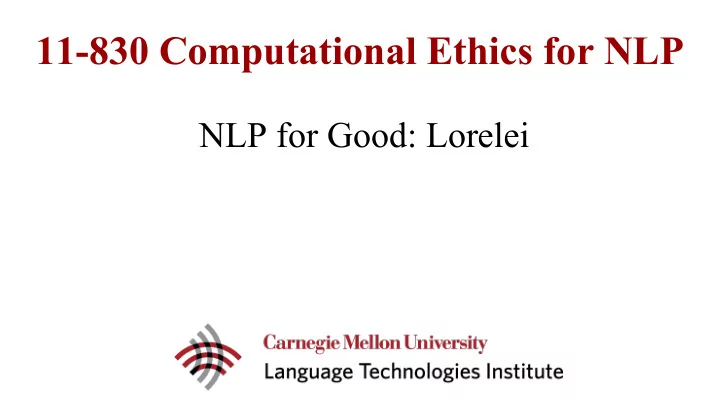

11-830 Computational Ethics for NLP NLP for Good: Lorelei
Government Investment in Languages Language Technologies mostly developed for High Resource Languages English, Spanish, German, Arabic, Mandarin What about the other 6995 languages? Maybe 30 have good resources (ASR, Treebanks, Parsers) What about those around 300-1000? > 1 Millions speakers, Have media (writing systems) If no immediate commercial value no support happens 11-830 Computational Ethics for NLP
Government Investment in Languages Language Technologies mostly developed for High Resource Languages English, Spanish, German, Arabic, Mandarin What about the other 6995 languages? Maybe 30 have good resources (ASR, Treebanks, Parsers) What about those around 300-1000? > 1 Millions speakers, Have media (writing systems) If no immediate commercial value no support happens But Wars and Religions! People will spend money to develop non-commercial support if They want to spread the word, (or stop the word) 11-830 Computational Ethics for NLP
US Government LT Investment DARPA Invested in MT from 1940s Invested in ASR from 1970s Invested in Dialog systems from 1990s Invested in Speech Translation from 1990s Case study Lorelei (2015-2020) 11-830 Computational Ethics for NLP
The Scenario Disaster happens! (e.g. earthquake) Area effected doesn’t use major language Communication is in local language News, TV/Radio, Social Media What is going on? Where should you provide support Who is affected How many people need help What is the urgency 11-830 Computational Ethics for NLP
Lorelei Incident Disaster happens! (e.g. earthquake) Communication is in local language News, TV/Radio, Social Media Provide Machine Translation NER Situation Frames (11 types) plus location, status, urgency, “gravity” 11-830 Computational Ethics for NLP
Lorelei Incident Disaster happens! (e.g. earthquake) Communication is in local language News, TV/Radio, Social Media Provide Machine Translation NER Situation Frames (11 types) plus location, status, urgency, “gravity” Do this in 24 hours 7 days 30 days You are told the language at hour 0 11-830 Computational Ethics for NLP
Lorelei Evaluation Exercises May 2016: Dry Run (Mandarin) July 2016: Uighur (Turkic Language spoken in Western China) July 2017: Tigrinya and Oromo (spoken in Eritrea and Ethiopia) July 2018: Kinyarwandan and Sinhala Sep 2018: Albanian 11-830 Computational Ethics for NLP
Lorelei Performers Providing complete systems (with components from elsewhere) USC/ISI (with UIUC, Notre Dame) CMU (with UW, Melbourne and Leidos) BBN (with JHU, UPenn) Other components Columbia (urgency, sentiment) UTEP (SF from prosody) 11-830 Computational Ethics for NLP
Techniques Perform in pronunciation space Not words, morphemes or character space Cross Lingual Transfer If w3_l1 co-occurs with w1_l1, w2_l1 Maybe w3_l2 means trans(w3_l1) if trans(w1_l1),trans(w2_l2) e.g. China, Japan and Korea vs 中国 , 日本 , 韓国 Very Low Resources Religious Texts (Bible, Quran and Unix Manuals) Wikipedia Native Informant (“taxi” driver bilingual for limited time) 11-830 Computational Ethics for NLP
Techniques Global Linguistic Knowledge High morphology language more likely to be free word order Close language borrowing linguistic/geographic/colonial Uighur numbers are Turkish-like Merci is casual Arabic for “thank you” Pashto (Indic) has many Dari/Farsi lexemes “Petrol” might be called “gas” Nothing is spelled consistently The dialects aren’t well defined The registers aren’t well defined People code-mix all the time 11-830 Computational Ethics for NLP
Lorelei Advances Techniques for low resource languages Translation, interpretation, sentiment Both particular languages, and general techniques Machine Learning Better use of limited data Not naive just end-to-end Using large mono-lingual dataset to improve models Using structure to make learning easier Helping people get immediate help in earthquakes 11-830 Computational Ethics for NLP
Recommend
More recommend